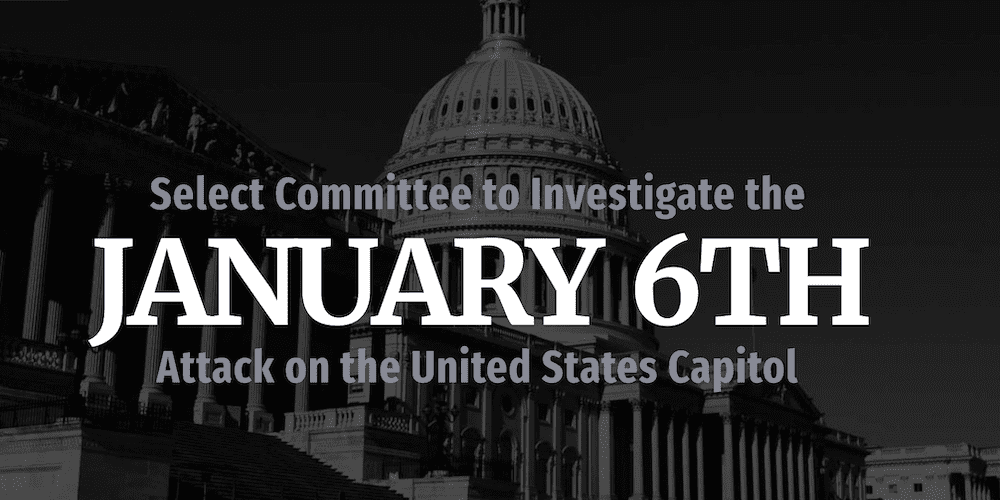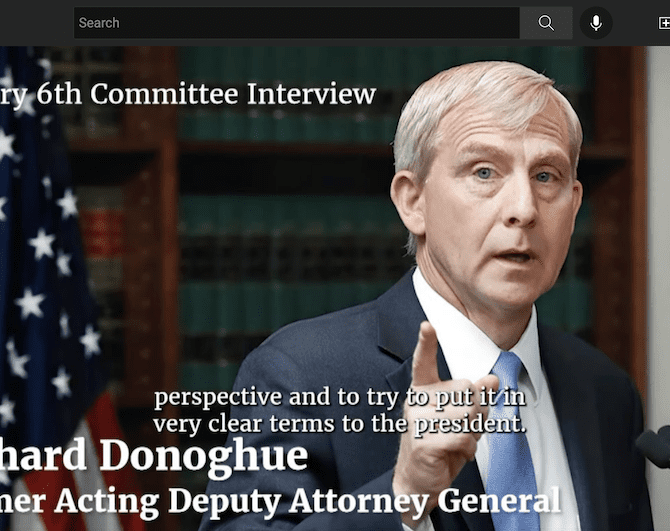As January 6 Hearings Begin, Poll Finds Many Conservatives Have Open Minds

(Image credit: https://january6th.house.gov/)
As the House Select Committee to Investigate the January 6 Attack on the U.S. Capitol holds its first televised public hearing in prime time on Thursday, June 9, a nationwide poll has found that there are more Republicans “open” to changing their minds about what happened than there are immovable Donald Trump loyalists.
The findings by Lake Research Partners, led by the veteran and reputable pollster Celinda Lake, suggest that Trump’s grip on Republicans is confined to one-third of the party, and, should the House committee present an emotionally compelling narrative that is an affront to conservative voters, that the disclosures could leave lasting impressions that impact the 2022 general election and their overall views of Trump.
“Only about a third of Republicans” remain unflinching Trump loyalists, said Lake, discussing her April survey of 1,200 likely midterm voters, when asked if she saw any indication that Republicans might be open to new emotions about what happened surrounding the attack.
“What’s much more interesting is that a fifth of Republicans… actually think this was a crime, and that it is a problem, and it should be punished,” she said. “And then [there is] the next proportion of Republicans, about another 20 percent, who think that if crimes were committed—and… trying to threaten the president, [threaten the] vice-president, or fight the FBI is a crime—then they think that should be punished, and they think [that those] people should not run [for office].”
Lake’s comments were part of a briefing by the Defend Democracy Project, one of many press conferences being held in Washington that seek to set the stage for the hearings about Trump’s “attempted coup,” as a Brookings Institution report on “the question of criminality” released on Monday, June 6, put it.
In many respects, the known facts surrounding the January 6 uprising are irrefutable and overwhelming. That doesn’t mean that the committee won’t provide new details about the plot, along with its players, tactics, and execution. But Lake’s research suggests that the conventional wisdom, that Americans’ minds are made up, isn’t accurate.
“The first point is that voters assign remarkable importance to January 6 and are paying a lot of attention,” she said. “I was, frankly, quite surprised by this.”
Lake discussed views by Democratic, Independent, and Republican voters when it came to the January 6 investigation. Democrats were the most concerned about the importance of January 6, the potential for future insurrections, whether the plot and riot were crimes, and the need to hold participants accountable. Independents were also very concerned and wanted accountability. And Republicans were not unified, including many who were open to changing their minds on what happened.
“I think there are about 44 percent of Republicans who are open[-minded],” Lake said. “They don’t tend to be the ones that think these [actors] were patriots… They are a lot of younger Republicans; a lot of Republican women, actually, as well.”
Such mixed sentiments echo how many Republicans voted in 2020—where tens of thousands of otherwise loyal Republicans in swing states voted for a majority of Republican candidates on their ballot, but not for Trump.
Changing Political Minds
Lake’s research suggests that if the committee can show conservatives that Trump and his cadre acted in irrefutable ways that offend their sense of American democracy, then many Republicans could change their minds about these politicians, led by their personal values and emotions.
Many on the left side of the political aisle and professionals like lawyers, scientists, and economists tend to discount the role of emotion in voting and politics, assuming instead that a dispassionate mind will weigh the evidence and rationally reach conclusions. But in politics, emotional responses tend to preempt facts, figures, and longer-winded rationales, as Drew Westen, a professor at Emory College specializing in clinical, personality, and political psychology, documented and discussed in his 2008 book, The Political Brain: The Role of Emotion in Deciding the Fate of the Nation.
“The political brain is an emotional brain,” wrote Westen. “It is not a dispassionate calculating machine, objectively searching for the right facts, figures, and policies to make a reasoned decision… What led voters to demand a change of course on [George W. Bush’s war on] Iraq in November 2006 was not that they had new information. They had new emotions. The compass had shifted from nationalist pride and hope to anger, concern, and a rising crest of resignation. ‘Stay the course’ made little sense in light of this emotional shift.”
Westen noted that many Americans—especially campaign consultants and pundits—“have grown accustomed to thinking about politics in terms of red states and blue states. But it’s easy to forget that the states that really determine elections are voters’ states of mind.”
This observation is timely as the June 9 hearing approaches. There has been an eruption of briefings detailing the facts, as presently known, surrounding the January 6 uprising.
For example, the other report featured in the briefing where Lake laid out her research was a new Brookings Institution report, “Trump on Trial: A Guide to the January 6 Hearings and the Question of Criminality.” The report cataloged “an astonishing array of legally unjustifiable schemes [by Trump and his supporters] to retain power.”
The report’s executive summary noted, “Trump attempted to retain power by any means necessary,” “Trump prepared an unsupported narrative of a stolen election long before November 3,” “Trump told multiple, shifting, mutually inconsistent stories about fraud,” “Trump is on the record invoking fraud as an excuse for retaining power,” “Trump was repeatedly told by trusted advisors, experts, and courts that there was no fraud,” “Trump and his supporters repeatedly failed to adduce evidence of fraud,” and more. The scope of evidence presented against Trump and his supporters by the report is overwhelming, even as it omits what some congressional Republicans did—including refusing to cooperate with the committee.
But even in the midst of so many facts about what was criminal about January 6, facts alone won’t change minds, as Westen’s book noted, explaining that the “political brain” is wired to fabricate rationales, deflect criticism, and even find comfort in its biased and incorrect conclusions.
“[W]hen partisans face threatening information, not only are they likely to ‘reason’ to emotionally biased conclusions, but we can trace their neural footprints as they do it,” Westen wrote. “The brain registers the conflict between data and desire and begins to search for ways to turn off the spigot of unpleasant emotion. We know that the brain largely succeeded in this effort, as partisans [interviewed in Westen’s research] mostly denied that they had perceived any conflict between their candidate’s words and deeds.”
“[T]he political brain also did something we didn’t predict,” Westen continued. “Once partisans had found a way to reason to false conclusions, not only did the neural circuits involved in negative emotions turn off, but circuits involved in positive emotions turned on [to make individuals feel good about their views]… giving new meaning to the term political junkie.”
Westen said the structure of the brain cannot be changed, as it “reflects millions of years of evolution. But we can change the way we appeal to it.”
Changing that appeal is one of the most crucial tasks before the House committee. Will it find ways—through the witnesses called, interviews on video replayed, and real-time reactions to the medium of live TV—to present a storyline that emotionally engages the electorate, including conservative voters, and changes minds?
Lake’s polling found that Democrats need no convincing. Nor do two-thirds of Independents. Among Republicans, she found that 44 percent have open minds, and her research further identified what acts are most concerning to conservatives.
In descending order, they are actions that: “Threatened the vice president,” “Supported white supremacists who endorsed the January 6 attacks,” “Promised pardons for violent behavior,” “Encouraged and supported the attackers,” “Blocked the FBI investigation,” “Helped pay for attackers’ trips to Washington, D.C.,” “Shared confidential information about congressional proceedings with the insurrectionists,” “Called the people who were involved in the January 6 attack ‘patriots,’” “Made a statement in support of the January 6 attacks during the attack,” and “Helped Trump spread lies about the outcome of the 2020 election and the possibility of it being overturned.”
The House committee knows the stakes and has hyped its coming presentation—based on a 10-month investigation, 100 subpoenas, 1,000 interviews, and 140,000 documents, as the Defend Democracy Project briefing noted.
“The select committee has found evidence about a lot more than incitement here, and we are going to be laying out the evidence about all of the actors who were pivotal to what took place on January 6,” Rep. Jamie Raskin, D-MD, told the Washington Post on June 6. “Watch the hearings. The hearings will tell the story.”
The hearings will tell a story. But will it change some Republican minds?






